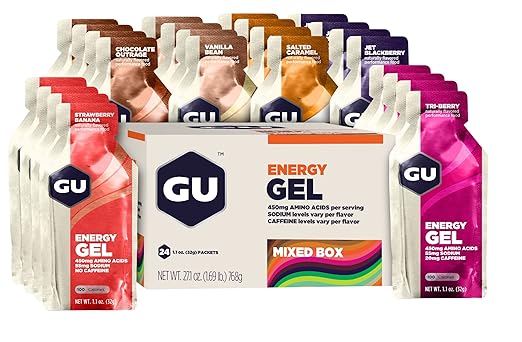Running a marathon in under 4 hours is a hallmark achievement for many runners out there and it should be. My first marathon is over 4 hours and I have a number of friends who have a sub-4:00 marathon as a target goal for this fall.
Recently I wrote an article on RunnersGoal.com about what an achievement a sub-4:00 marathon is. Running a marathon in under 4 hours will essentially put you in the top quartile of marathon finishers out there. Naturally, that begs the question of how does one train to run a marathon in under 4 hours.
Experience with Sub-4:00 Marathons

I have run a number of marathons and as I previously noted my first marathon was over 4 hours. Granted there were some extenuating circumstances associated with that marathon but over time I have been able to lower my personal best marathon time to 3:03:27 at Leavenworth in 2012.
The sub-4:00 marathon will come easier for some than others. For some it will not come naturally and will take some structure and dedication to achieve your goal. That said, the bottom line is that it is very possible to run a marathon in under 4 hours but you are going to have to work for it.
First a word of caution; while a sub-4:00 marathon is an laudable accomplishment, it cannot and should not define who you are as a runner. The love of running is much more than achieving an arbitrary time standard. I know several people who will likely never be in a position to run a marathon in under 4 hours and they are some of the most dedicated, passionate, and praiseworthy runners I have ever encountered. If you run a marathon in 6 or 7 hours you deserve every bit of the same respect and accolades as someone who runs the same race in under 3 hours.
Related: Average Marathon Times By Age
The Importance of Nutrition
Before we talk about a specific training plan for your 4 hour marathon, I’d be remiss if I didn’t briefly mention nutrition. Proper nutrition is critical for a distance runner. It’s not just about race day, either.
You need to figure out a consistent plan during training and on race day and stick with it. A common rookie mistake is to try things on race day like eating too much or drinking too much water – thinking it will help you.
If you didn’t do it during training, don’t do it on race day.
Don’t try any new foods, drinks, or supplements just because they are available for free at the race. You’re not sure how your body will react to it, and it isn’t worth the risk once you’ve reached the day you’ve been training for. So stick to what your body is used to.
For me, I used to run with a running belt stocked with Gatorade. However, I now simply bring my own GU (shown below) and stop as needed for water during the race.

If this is your first half marathon and you aren’t used to energy gels – I’d suggest buying a variety pack like this and figuring out what works best for you. These things can really help sustain you throughout the race.
Elements of Successful Training
To run a sub 4-hour marathon you are going to need to be able to run 26.2 miles at a pace that is equivalent to a 9:10 per mile or faster. To be able to run that pace for that far you are going to need a structured plan. You are going to need to build your running endurance and get used to running at an intensity around the pace you plan to running on marathon day. You are going to need to build yourself up and start getting used to changing speeds while you are running.

To successfully run a sub 4-hour marathon you are going to want to have a training program that is based on consistency and involves four primary elements: speedwork, marathon pace tempo runs, long runs and recovery.
A lot of times when one prepares for a marathon there is a lot of focus on the long run and there should be since this is the element that will help you simulate the experience of your marathon. Without a doubt the long run remains the single most important element of a marathon training program but if you want to run a marathon fast, you need to get used to running fast and that is where speedwork and marathon pace tempo running comes in.
A final element that I would recommend as part of any marathon training program is some elements of strength training. Strength training will help you to avoid injury as well as develop the muscle fibers that give you an extra boost out on the race course.
Here is what I would recommend for each one of these elements:
Long Run – Like I noted the long run is the most important element of any marathon training program. There are a lot of philosophies out there about how fast one should run their long runs. There are those that suggest that the benefit of the long run is really time on your feet and pace is not important while others will tell you that it is necessary to run your long runs not tangibly slower than your anticipated marathon pace. To me the answer is in the middle. The time of your feet aspect of the long run is important as that is the way you are going to build yourself up to a point of being able to take the beating of marathon day. That said, if you want to run fast you have got to get your body used to running fast. What I have found that has worked for myself is that if I run my long runs around 45 seconds t0 1:30 minutes per mile slower than my anticipated marathon pace, I have been successful. If you are shooting for a sub-4 hour marathon I would recommend trying to hit a pace right at or slightly faster than 10:00 per mile.
Marathon Pace Tempo Runs – Aside from the long run, the marathon pace tempo run is really the next most important workout for marathon success. In a tempo run of this nature one would warm up for a mile or two and then run at slightly faster than anticipated marathon pace (9:10 mile pace for a 4-hour marathon but I would recommend one target a 9:00 mile pace) for a specified distance. This get your body used to running at marathon pace by helping you work on your lactate threshold (i.e., pace or intensity at which you body can remove lactate from your bloodstream). This is the most important workout for being able to run and sustain your pace over the long haul.
Speedwork – Speedwork can take many forms but every variant is focused on helping your body learn how to run at a fast pace, faster than the lactate threshold pace. This in turn helps you improve your VO2max (or body’s oxygen utilization efficiency) and speeds you up. The importance of VO2max or speedwork in your training is directly proportional to distance so the shorter the distance of your race. Since the marathon is a long race, speedwork is important but not as important as the other elements of a successful training program. In other words, if your week is going to pot, drop the speed workout from your training plan first so you can still get your tempo and long runs in. Like I noted, speedwork can take lot of different forms but for me, in the context of a marathon training program, I have found that 1 kilometer and 1 mile repeats at around 5k to 10k race pace work best. For a 4-hour marathon an equivalent 5k pace would be 7:56 mile pace and 10K pace is 8:14 mile pace. These “intervals” can be run as part of a fartlek-type workout or on a track or treadmill with some rest in between. Unless you are like me and actually enjoy getting out to the local track for speedwork, I would recommend just incorporating your speedwork into a standard distance run as fartlek-type workout. In such a workout, one would warm up for a mile and then alternate running at 5k-10k race pace for either 1k or 1 miles before settling into a jog for an equivalent distance as the interval (i.e., 1k to 1 mile) before starting the process again. You would repeat this until you completed the number of intervals that your plan calls for.
Recovery Runs – These are what they sound like they are. One should never do two hard workouts back-to-back. You are going to want to break those up with a recovery run where you are just going out for a run and doing what your body allows you to do. On these sort of runs just do what you can as the objective is to get out and run for the enjoyment of running and while you are at it working out the residual effects of your harder efforts.
Strength Training – You do not need to go crazy here. Keep it simple. All you are trying to do here is to strengthen your core and joints to increase your power and make your body more resistant to the wear and tear of a marathon training program. No need to get a gym membership and really all you need to do is what you learned in gym class. I am talking push-ups, pull-ups, sit-ups, lunges, squats, etc. What I have found that works for me is to do these sort of exercise 2-3 times as week for the biggest bang for your buck.
Recommended Training Plan
Ok, so now you know the elements, how do we put that together into an overall plan? There are a lot of plans out there on the internet – some good and some not so good. In reality the best way to develop a plan is to know yourself – your strengths, your weaknesses, your ability to recover, etc. to make a solid plan.
That said, if a friend of mine came to me and asked what plan should they should follow if they wanted to break a 4:00 marathon, I would recommend a 16 week plan that incorporates all of the elements that we have previously discussed. Some may be able to get away with a 12 week plan depending on what your mileage base has been but to be successful a 16 week plan gives you the best opportunity.
Going into any such plan, you have to have some running experience and I would recommend that you follow these guidelines when determining when to jump into a marathon training program. In reality, the outlined plan below considers that one has already had the experience of training for and running a marathon but now wants to see if they can break the elusive 4-hour mark.
Everyone has a different schedule so some days are more convenient than others for certain types to runs. The days on this schedule can be flipped around to some degree but what you want to do is make sure you do not have two hard days (i.e., speed, tempo, or long) on two consecutive days and you want to try to be as consistent as you can on day of the week of your hard days (for example long runs on Saturdays, Speedwork on Tuesdays, etc.).
|
Day #1 (Recovery) |
Day #2 (Speed) |
Day #3 (Recovery) |
Day #4 (MP Tempo) |
Day #5 (Recovery) |
Day #6 (Long) |
Day #7 (Rest) |
|
| 1 |
6 Miles |
3 x 1k |
4 Miles |
4 Miles |
4 Miles |
8 Miles |
Off |
| 2 |
6 Miles |
2 x 1 Mile |
5 Miles |
5 Miles |
4 Miles |
12 Miles |
Off |
| 3 |
6 Miles |
4 x 1k |
4 Miles |
6 Miles |
5 Miles |
14 Miles |
Off |
| 4 |
6 Miles |
3 x 1 Mile |
5 Miles |
7 Miles |
6 Miles |
12 Miles |
Off |
| 5 |
6 Miles |
5 x 1k |
6 Miles |
5 Miles |
5 Miles |
16 Miles |
Off |
| 6 |
6 Miles |
3 x 1 Mile |
5 Miles |
7 Miles |
6 Miles |
14 Miles |
Off |
| 7 |
6 Miles |
6 x 1k |
6 Miles |
8 Miles |
7 Miles |
18 Miles |
Off |
| 8 |
6 Miles |
3 x 1 Mile |
5 Miles |
8 Miles |
6 Miles |
16 Miles |
Off |
| 9 |
6 Miles |
6 x 1k |
6 Miles |
8 Miles |
8 Miles |
20 Miles |
Off |
| 10 |
6 Miles |
4 x 1 Mile |
5 Miles |
9 Miles |
8 Miles |
16 Miles |
Off |
| 11 |
6 Miles |
6 x 1k |
6 Miles |
9 Miles |
6 Miles |
22 Miles |
Off |
| 12 |
6 Miles |
4 x 1 Mile |
5 Miles |
9 Miles |
8 Miles |
16 Miles |
Off |
| 13 |
6 Miles |
6 x 1k |
6 Miles |
10 Miles |
6 Miles |
20 Miles |
Off |
| 14 |
6 Miles |
3 x 1 Mile |
5 Miles |
10 Miles |
8 Miles |
12 Miles |
Off |
| 15 |
6 Miles |
4 x 1k |
6 Miles |
10 Miles |
6 Miles |
8 Miles |
Off |
| 16 |
6 Miles |
4 Miles |
4 Miles |
Off |
2 Miles |
Race |
Off |
MP = Marathon Pace Tempo Run
[thrive_leads id=’2421′]
There are many other plans out there and many of them might get you to your race goals. Nonetheless, if you completed the recommended plan previously outlined and did so at the recommended paces, I am confident that you will be fully prepared to break the 4-hour mark. Good luck!


On the tempo runs is the warmup part of the miles indicated?
Did you ever get a response on this question? This plan looks really promising.
I warmed up at whatever pace I felt like for about 1/2 mile and then kicked it up to my goal race pace for the remainder. My warmup pace usually came pretty close to my race pace anyway, especially in the latter part of the training when you’re logging a lot of time at that pace and the weather cools down (if you’re training for a race held during the traditional fall marathon season).
This plan definitely works. I just ran the 2014 Edinburgh marathon in 3:49.08. Missed a week due to injury and the odd day now and again due to work and family. I was worried about the missed days but I had a plan on the day and stuck to it. Over the moon with the result.
Did you follow all the prescribed paces or did you increase them to run that well??
This plan worked for me. While I’ve only run 2 marathons and I was injured leading up to the 1st & still ran, I shaved 28 minutes off my time finishing with a BQ time if 3:50. Thank you!
Thank you for the training plan! 4 miles “speed” workout for the last week of training? Or should that be at recovery pace? Thanks!
I just used this plan to finish Chicago in 3:58 and change. I ran that 4-mile speed workout during the last week of training as a 4 x 0.50 speed workout. I think it kept my fast-twitch muscles tuned up and helped me turn in two really fast miles at the end of my marathon the following Sunday.
I trained for the LA Marathon which I ran with my 13 year old son in 5:55 then used this plan to train for a sub 4 hour marathon and only started with 7 weeks to go. Shortly after I started the plan, I started running faster than what the plan was calling for and toward the end I was running a 7:45 mile for 16 miles pretty comfortably so I decided to try for 3:30. I ended up with 3:33. I am 54 years old and this was my third marathon. My first was LA in 2003 where I hit the wall and ended with a 4:28 time. This plan helped me reduce my PR by nearly 1 hour. I couldn’t be happier.
This seems like a really good plan. I am training for my first marathon. This past weekend I completed a half marathon at 8:18 per mile average doing negative splits, and I have been curious how much my time will drop as I push for more miles. For the half marathon, I used a camelbak with salt water, and now will use that with some organic fruit chews for the 15 miler this weekend. I think I will incorporate some of this information into my thrown-together training program.
I’ve been trying to get under 4 hours for three years. My best was 4:02 a year ago. I followed this plan, with some minor modifications, and just ran 3:48 for a BQ. I’m a believer. Thank you.
i ran the Cape Town Marathon , look my time, by the half mark (21 KM) 1h56 by the 30 km 2hrs 50minutes, After the 30km there is no power in my bones, i walk all the way to the finish My finish TIME is 05h30… please help me, how can I PERFORM AFTER THE 30KM, PLEASE HELP ME
Thanks
Corrie
Hi Corie, what was your mistake for bonking?
I trained for my fifth marathon, Chicago on 10.11.15, by following this plan and finished with a PR of 3:58:36. I think I would have posted a faster time if the weather had not been so unseasonably warm (80F at the finish). I was really pleased with my performance and not at all sore following the race. I plan on running another marathon next year and will use this program again, but run at faster paces and incorporate core and leg-strengthening exercises in order to come in with another PR. I did deviate from the plan a bit by: (1) missing 2 days of training (on recovery days only); (2) shaving a couple miles off a run here and there (on recovery days only); and (3) skipping the strength training completely.
I don’t think I trained for my first marathon correctly. I went into not thinking about pace. Trained with a few other people for most runs. I feel like a sub 4 would be a stretch but wonder if it’s too late and would I crash and burn. Recently I have a 15 miler with 9:01 average and had energy to do more miles. Most of my shorter/mid runs are between 8:20-8:45 pace. My 20 was a 9:27 average but ran first 6 over 10min miles with a group of people before I went off alone and def could have pushed out a couple more miles. Should I try? Or should I not? I have one week till MCM and I am wishing I would have trained for sub 4 instead of just winging it.
Hi and thanks for the plan,
I am following your plan and I am two and a half weeks out from my marathon date, one quick question, the 4 miles on day 2 of week 16, its under the heading speed, will I take it as a tempo run or a MP run,
thanks
Dave
Where are the long runs in this program? Are the 20 milers not necessary under this program?
Quick question on the speed work. When it says ‘3x1k’ for example, is that warm-up, run a kilometre at pace, run another to warm down, and then repeat another two times? In other words, if it says 3×1, does that mean about 6k in total, three of speed and three of jogging? That’s what it sounds like.